- Home
- Martha Freeman
The Orphan and the Mouse Page 10
The Orphan and the Mouse Read online
Page 10
The other guys in the intermediate dorm understood at once and agreed cats had it made.
But Caro was disgusted. Caro believed in doing things, and worse yet, she frequently wanted Jimmy to help.
On Friday morning as the children filed into breakfast, Jimmy caught sight of Caro and immediately knew that something was up. She had a deep furrow in her brow, which meant she was worried, but not only worried—worried and determined to do something.
Jimmy was tired just thinking about it. Whatever today’s plan was, it was going to be a doozy.
“Talk after breakfast,” she whispered to him as they made their way to the line for clean-hands inspection. “It’s important.”
Mrs. George did not make any announcements that morning, so the children had free time before chores. Caro made a beeline for Jimmy even before he’d left the table.
“Okay, okay—gee whiz. What is it I gotta do now?” Jimmy asked her.
The other boys laughed and elbowed each other.
“Come with me,” Caro said, and all but dragged him to the front piano parlor, where they would not be disturbed.
The children did not like the front piano parlor. It was close to the sidewalk, with a picture window. Sometimes passersby peered in or pointed “like we was zoo animals or something,” according to Melissa. The furnishings, too, were all wrong—fussy and old-fashioned, uncomfortable for fidgety children.
Jimmy was curious to learn what Caro wanted. But it was beneath his dignity to let her know that. So he dropped down on the settee and made his voice bored and annoyed. “What is it now?”
Caro pulled two things from her pocket. One was a piece of newspaper, which he could look at later. But the other, an old gray metal key, caused his heart to miss a beat. Had Caro lost her mind? She would get them both whipped!
“Where did you get that?” he asked.
“Shhh—keep your voice down,” Caro said. “Do you know what it is?”
“I’ve seen it before,” he said. “It belongs in a box on Mrs. George’s desk. I think it’s a spare for her apartment.”
“So that’s what they want,” Caro said.
“That’s what who want? What are you talking about?”
“You won’t believe where I got it, or this”—she indicated the paper—“either. I found them on my pillow this morning after I was through washing up.”
“One of the girls must’ve put them there,” Jimmy said. “Is somebody mad at you? Are they trying to get you in trouble?”
“That’s not it,” said Caro, “and please don’t say I’m crazy. I think the mouse . . . the one I rescued? I think the mouse put them there. It wants us, that is, me, to do something. But I can’t do it alone. You have to help.”
Jimmy’s jaw dropped in surprise, but a moment later he was laughing so hard that Caro had to kick his shin.
“The mice are talking to you now?” he said when he’d caught his breath. “Oh, Caro. That’s a good joke.”
“No, listen,” said Caro. “You know the fable about the lion and the mouse?”
Jimmy shrugged. “I remember Miss Ragone read to us from that Aesop book.”
“The lion spared the mouse’s life,” Caro reminded him, “and the mouse swore he’d help the lion sometime. The lion thought how could an animal so puny help him—the king of the forest? But then he got caught in a hunter’s net, and the mouse gnawed the ropes and set him free.”
Jimmy shook his head. The world according to Caro was a lot more complicated than the world according to him. “Oka-a-ay,” he said. “So you’re saying the mouse is trying to set you free?”
“I’m saying I helped the mouse, and now it wants to help me. Only I don’t know how it wants to help me. But here’s the other thing, the more important thing.”
She displayed the scrap of paper and told Jimmy how the day before, Mrs. George had shown her the newspaper on her desk, the one with a hole in it. “She said the mice tore it, and I think this must be the piece they took. Look how uneven the edges are. It’s because they had to tear it with their teeth, gnaw it.”
Jimmy examined the paper and got a queer feeling in his belly. Was it possible Caro wasn’t crazy after all? “But why—” he started to ask.
“Read it,” she said. “All of it.”
Baby Boy Taken
PHILADELPHIA—Police say a male infant less than 36 hours old may have been taken from the West Lying-In Hospital sometime Wednesday.
The infant, born to an unmarried woman whose name was not disclosed, disappeared during morning visiting hours. Nursing staff told police the woman’s account of the child’s disappearance was incoherent as a result of her extreme emotional distress.
Police planned to interview her further today. There were apparently no other witnesses to the baby’s disappearance.
The missing infant is a Caucasian male with light hair. Police are asking anyone with knowledge of the baby’s whereabouts to please telephone.
Jimmy was not always a fast thinker, but he could put two and two together. “You think this might have something to do with Charlie. But there’s lots of babies born in a city every day, aren’t there?”
“Probably,” Caro said. “But it’s a pretty big coincidence that this light-haired baby boy disappeared from a hospital right before Charlie showed up here. And there’s something else, too.” She explained about the forceps marks and Mrs. George’s inconsistent story.
Jimmy thought for a minute. “Let’s say you’re right. Then who brought him here? Charlie didn’t just up and crawl away from the hospital.”
“The police brought him,” said Caro.
“The police wouldn’t bring him here and then tell the newspaper he was missing,” Jimmy said. “Something’s fishy.”
“That’s why I wanted to talk it over with you,” said Caro. “I’m trying to understand.”
Jimmy was flattered that Caro thought he could help her with a puzzle as hard as this one. But could he? He only knew one thing. “Don’t say anything else about it to Mrs. George. She might be in on it.”
“Oh, Jimmy, no. That’s impossible,” Caro said. “She’s . . . she’s Mrs. George.”
“I know everyone thinks she’s a saint, but not me,” said Jimmy.
“She lost her temper that time, that’s all. What I think is that Mrs. George might be in trouble, and the mice want us to help her.”
“That’s nonsense, Caro. Why do the mice want to help her? She hates them! She called the exterminator!” Jimmy said.
Caro put her hands on her head and squeezed her eyes closed. “I know it doesn’t make sense. Nothing makes sense—except one thing. We have to do one thing.”
Uh-oh. Here it came. “What’s that?” Jimmy asked.
“Use this key,” said Caro.
Jimmy’s heart went thud. Was she serious? If they were caught, the boss wouldn’t just whip them, she would behead them. But before he could argue, Matron Polly appeared in the doorway.
“Oh, there you are, Caro. As for you, Jimmy, aren’t you late again?”
“I’m going now,” said Jimmy.
Caro said, “I’m sorry. I know my chore today is laundry.”
“Not right now it isn’t,” said Matron. “Mrs. George wants to see you . . . again.” Then she smiled. “I think it’s good news.”
Chapter Forty-Three
In the few hours since Caro had awakened that day, she had learned that baby Charlie had been kidnapped and—more amazing still—that mice were leaving her communications.
For one brain in one morning, that should have been enough. But now there was something new.
She was going to be adopted!
By the time she left Mrs. George’s office a few minutes later, the poor child felt entirely overwhelmed.
A man—a nice man, according to Mrs. George—would arrive by automobile the very next morning to drive her.
“A family of your own, Carolyn. Think of that!” Mrs. George had said.
And
she had gone on to paint a beautiful picture. A mama and a papa. Two little sisters. A big house with trees and fields all around.
It was wonderful!
It was scary.
Caro’s whole life, everything she had known for five long years, was about to change. And change was hard.
Stunned as she was, Caro had still asked questions, and Mrs. George had done her best to answer. They were a loving family. They wanted a responsible older girl, someone to help look after the little ones.
“They want me for a servant?” Caro had said.
“No, no, dear. They want a daughter, an eldest daughter, a helpful daughter—someone just like you. I believe perhaps their own dear daughter . . . died.”
“How sad,” Caro had said.
“But not sad for you,” Mrs. George had said. “Fortunate.”
“But I don’t understand,” Caro had said. “How did they know about me? I’ve never even met them! Do they live here in Philadelphia?”
“They live in another state,” said Mrs. George vaguely. “There are other homes like ours elsewhere in the country, and sometimes we directors are in touch with one another. When I learned that there was a God-fearing, well-off family seeking a responsible girl to adopt, I thought of you. I’ve had to keep it quiet until now, until the details were worked out. But all that’s completed. I’m giving you a wonderful opportunity.”
Caro was so astonished, she hardly followed Mrs. George’s explanation of practical matters—how she was to travel, what belongings she could take—until one fact penetrated her confusion: She was to leave tomorrow! A man, a friend of the family, would pick her up early. She should say her good-byes to the children and to the staff that very night.
“You are excused from chores for the rest of the day,” Mrs. George had said. “I’m sure you have things to do, things to pack up. Matron will help you.”
“Oh, no, ma’am. Thank you very much, but I don’t want to be excused from chores,” Caro had said. “The other girls will have more to do then, and laundry is hard work, and that wouldn’t be fair. And anyway—”
“Yes?”
Caro shrugged. “It won’t take me long to pack my things, ma’am. I don’t have very much.”
Of all the chores at Cherry Street, laundry was the most despised. The washing machine, wringer, ironing board, washbasins, and clotheslines were all in the basement, which was clean and tidy but miserably hot and humid in the summer. The work itself was hard, too. Wet linens were heavy. Scouring stains made your shoulders ache and left your hands raw. The girls joked that the clothes were washed not only in water but in their own sweat.
Ironing was the worst job of the worst. Automatic irons had been invented in the 1920s, but in 1949 they were not yet reliable or universally used. Steam irons were a thing of the distant future.
The girls at Cherry Street had an old-fashioned iron, one that was heated on a stove and used until it cooled off, at which point it was heated on the stove again. Pushing an iron across cotton fabric was hot, muscular, and exacting labor. A moment’s inattention and you burned yourself or—and this was almost worse—scorched the fabric.
With her disfigured right hand, Caro could have begged off ironing altogether, but she never would, and that day a pile of boys’ button-down cotton shirts awaited her.
“You were late yesterday and you’re late again today. You’re gonna get in trouble,” Melissa said. She was nearest to Caro, rotating the handle of the wringer, whose rollers squeezed the water out of bedsheets so that they would dry faster.
Caro didn’t answer because she wasn’t listening, so Melissa repeated herself.
“What? Yes, yes, I suppose I’m going to get in trouble,” Caro said at last. Mrs. George hadn’t told her to keep the news a secret, but she wanted Jimmy to be the first to know. Before she could sort out her thoughts, she had to talk to him.
The morning passed slowly—one shirt following another, the other girls’ conversations swirling around and annoying her with their triviality. At one point, Caro was tempted to shout: “I’m leaving! I’ve been adopted! What do you think of that?”
And what would they think of it?
Would they envy her?
Yes, of course. Just as she would envy any child who was getting a family of her own.
But they would also miss her. And she would miss them, too.
Thinking of it, she felt tears well in her eyes. They were her family now, or the closest thing she had to one. Would they write to her? Would they forget her? She would never forget them.
But still, she didn’t say anything, and Barbara teased her for being lost in her own thoughts. Caro didn’t respond, which caused the other intermediate girls to look at one another and shrug. It was no fun teasing if you didn’t get a reaction.
Finally, it was lunchtime. The girls had ten minutes to wash before they filed into the dining room. Afterward, Caro could not have told what it was she ate; she had put the fork in her mouth mechanically, the same way she’d ironed the shirts, all the time waiting for the moment when she could talk to Jimmy.
The two friends met again in the front piano parlor and, all in a rush, she told him . . . and before she had even finished, he was shaking his head. “It’s a trick—don’t you see? It’s just like Charlie. He disappeared and now you will, too!”
“What?” Caro felt dazed. “No, Mrs. George wouldn’t—”
“Mrs. George wouldn’t, Mrs. George wouldn’t . . . nyah nyah nyah, Caro. You’re wrong and she would. She’s crooked and a liar and you don’t see it!”
Caro had never seen Jimmy like this—near tears, he was so frustrated. Instinctively, she tried to comfort him, but that only made things worse. “Of course you don’t want me to go. I don’t want to leave you, either. Don’t you think I’m scared, too?”
“Does the family know about your scars?” Jimmy asked cruelly.
Caro didn’t answer right away. “I don’t know. I didn’t think to ask.”
It was Jimmy’s turn to take a breath. “I’m sorry, Caro. I didn’t mean that. I’m just trying to make you listen to me. You can’t trust her. You can’t. What’s happened with Charlie proves it.”
Caro didn’t know what to say. Jimmy was wrong; she was sure of that. He was reacting this way because he was envious. Any of the orphans would be.
Chapter Forty-Four
Threatened by a feline, a rodent always flees in terror. This was the natural order; every creature knew it. So when the other night in the kitchen that mouse female had turned on Gallico and bared her teeth, it was entirely reasonable that he had been startled.
Not scared.
Never scared.
Merely startled.
That rodent had been lucky to escape with her life. The one in the boss’s living room now would not be. It wasn’t only anticipation of a bloody, tasty snack that excited Gallico. It was also his desire to exact revenge.
Moments before, the cat had been at his usual post on the boss’s sofa when the sound of breaking glass awakened him. He rolled over. He looked up. What he saw astonished him. On the wood floor beneath the boss’s writing desk was a small broken bottle, its liquid contents spilled to form a brilliant blue puddle in which a mouse seemed to be wading.
Stupid, clumsy rodent, Gallico thought. Having knocked the bottle from the desk to the floor and broken it, she didn’t know enough to stay out of the mess. When the boss returned and saw the stain, the boss would be apoplectic. If Gallico did not want to be blamed, he had better be well out of the way by then.
But first, he had a murder to attend to.
Eyes never leaving his prey, the big cat positioned himself and waited patiently for her to come out into the open where he would have a clear shot. Meanwhile, the rodent—her paws sticky, wet and blue—marched boldly and deliberately across the rug toward the kitchen.
Gallico gathered his legs beneath him, swished his tail once, twice, and . . . wait a second.
From across the kitchen
floor came a second rodent, this one a large male and at least as stupid as the first, squeaking for all the world as if he wanted to pose a challenge: “Look! Look at me! I’m over here!”
Trying to decide which mouse to dispose of first, Gallico mistimed his jump and overshot. Rather than landing his claws on the rodent’s neck, he landed his belly there.
No matter, thought Gallico. Decapitated or smothered, you’re dead either way.
The mouse, however, had other ideas. She did not succumb but bit the cat—actually bit him on the belly!—causing Gallico to howl in pain and protest before rolling his big body away. All the time the second mouse, the male, continued his diversionary tactics.
Cartwheels! Somersaults! Flips!
If he was trying to get the cat’s attention, he was succeeding—as well as hastening his own demise. As the female continued her stately procession toward the big white box where the boss kept food, Gallico aimed at the male and prepared to strike . . . but another distraction presented itself, the sound of human footfalls on the stairs.
It was not the boss. It was Matron Polly, paying her afternoon visit.
Mrrreeeow! Gallico’s frustration was complete. He must abandon his prey or be blamed for the blue spillage, which by now had expanded beyond the desk. In fact, those infernal rodents had left blue tracks everywhere.
Moments later, safely hidden beneath the boss’s bed, Gallico heard Matron Polly turn her key in the lock, heard her enter the apartment, heard her squeal.
She had seen the rodent!
Perhaps she would succeed where he had failed?
But she was much too slow. Gallico heard her moving about and muttering, “Oh—what a mess with all this ink! Well, one thing’s for certain. Yours truly is not cleaning it up. Far as I know, things were spic, span, and tidy when last I was here.”
Polly’s visits to the boss’s apartment were predictable. Today, as usual, she went into the kitchen and opened the white box. But instead of closing it immediately, she uttered an inarticulate cry and then, “Ha! Serves you right, you little beast!” After that the door slammed, and she said, “That’ll be a cold coffin for you.”

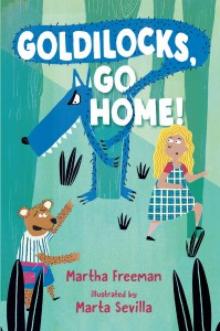 Goldilocks, Go Home!
Goldilocks, Go Home!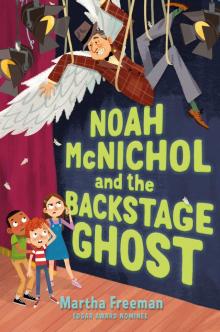 Noah McNichol and the Backstage Ghost
Noah McNichol and the Backstage Ghost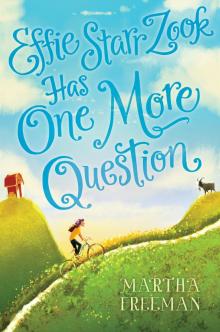 Effie Starr Zook Has One More Question
Effie Starr Zook Has One More Question P.S. Send More Cookies
P.S. Send More Cookies The Secret Cookie Club
The Secret Cookie Club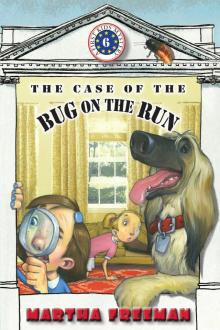 The Case of the Bug on the Run
The Case of the Bug on the Run The Case of the Rock 'n' Roll Dog
The Case of the Rock 'n' Roll Dog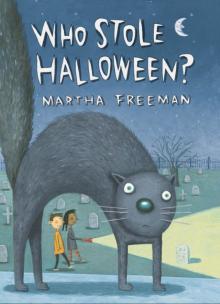 Who Stole Halloween?
Who Stole Halloween?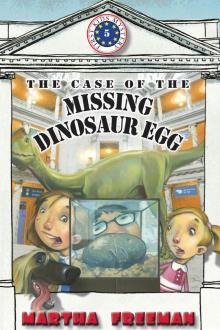 The Case of the Missing Dinosaur Egg
The Case of the Missing Dinosaur Egg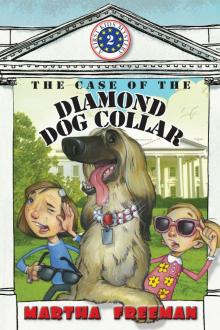 The Case of the Diamond Dog Collar
The Case of the Diamond Dog Collar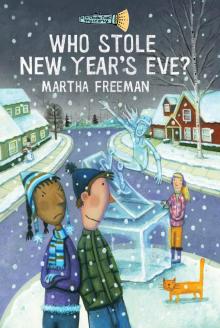 Who Stole New Year's Eve?
Who Stole New Year's Eve? Strudel's Forever Home
Strudel's Forever Home Campfire Cookies
Campfire Cookies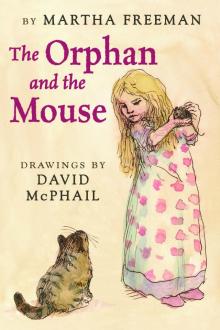 The Orphan and the Mouse
The Orphan and the Mouse Zap!
Zap!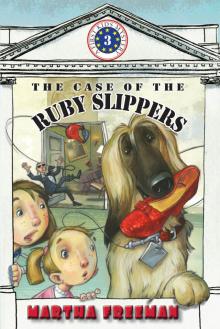 The Case of the Ruby Slippers
The Case of the Ruby Slippers